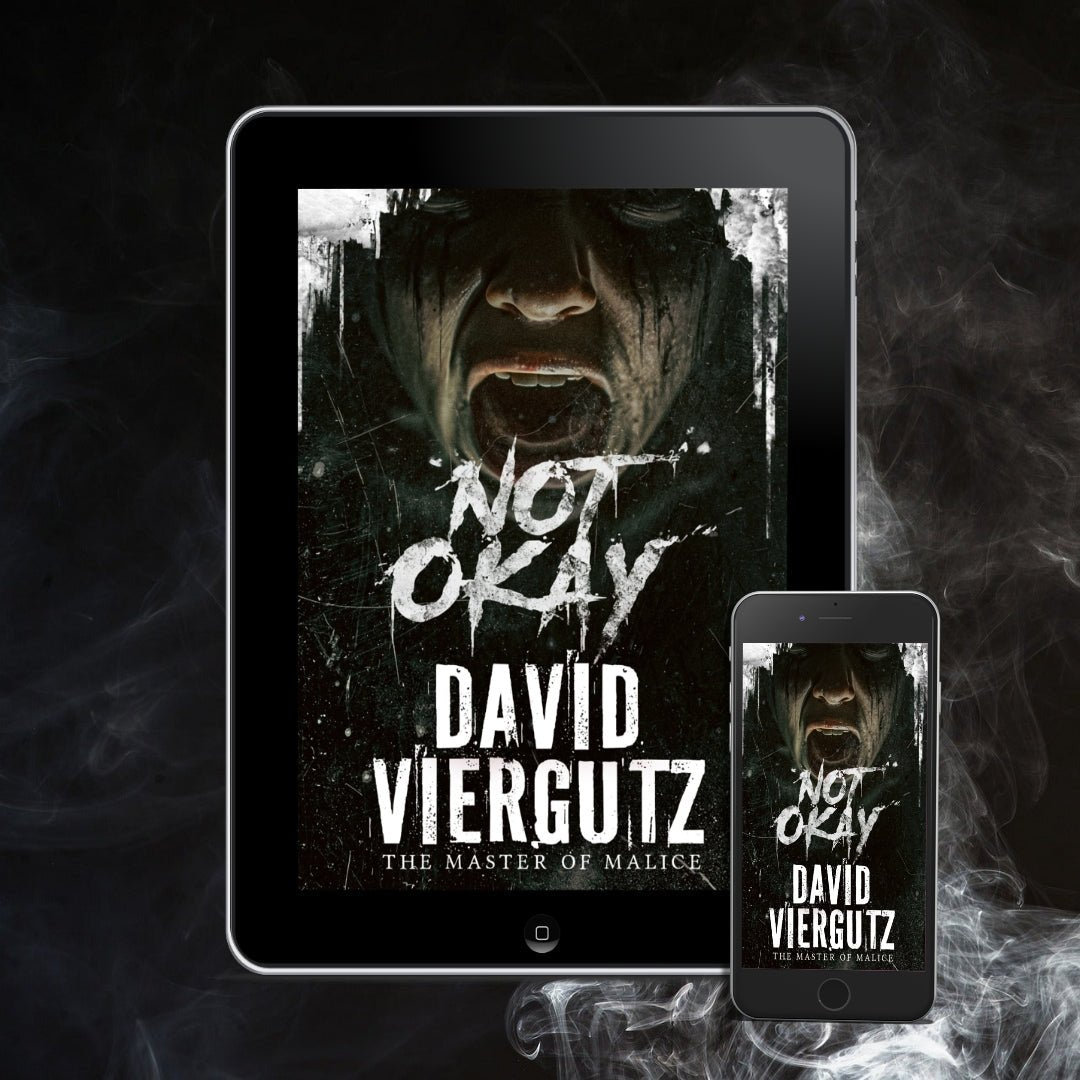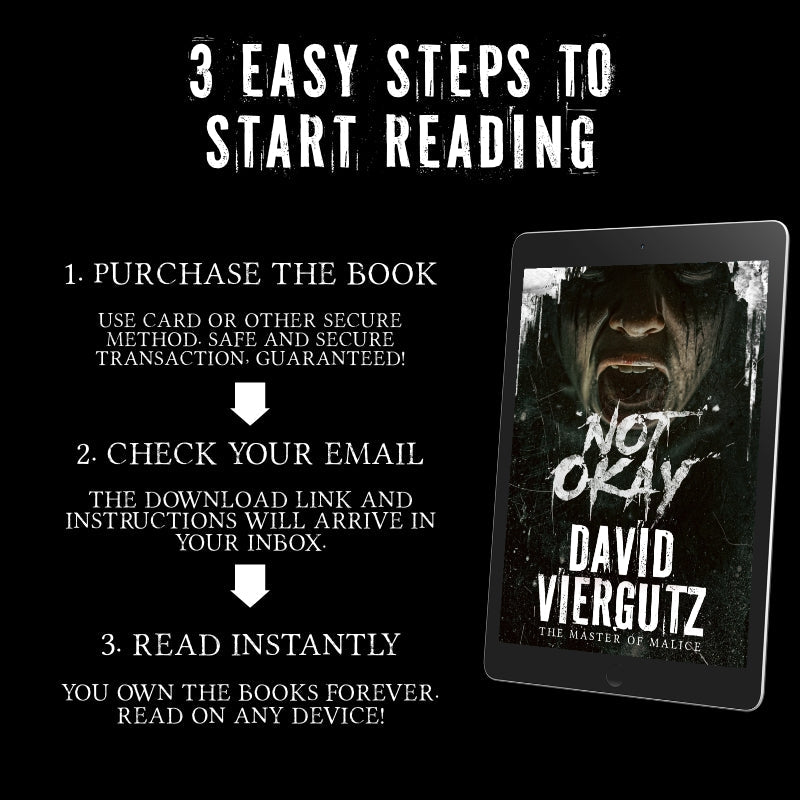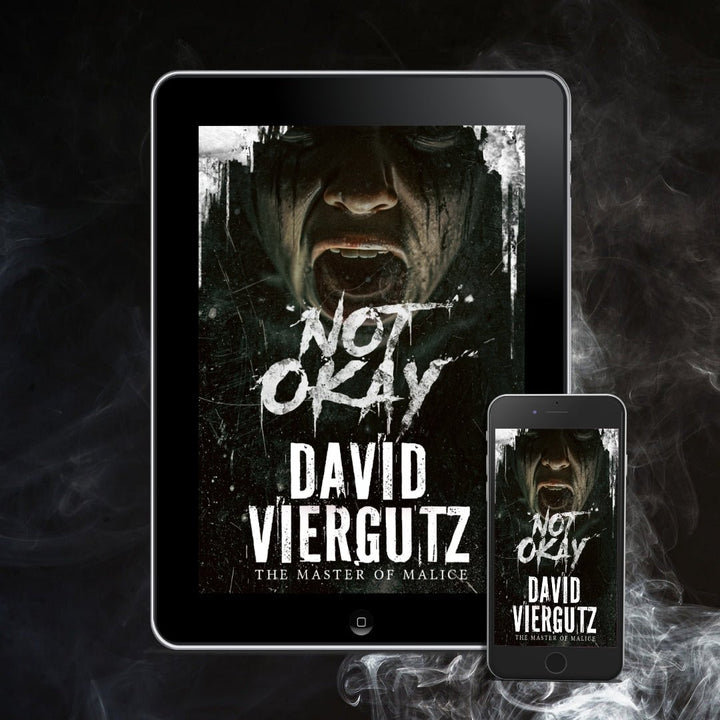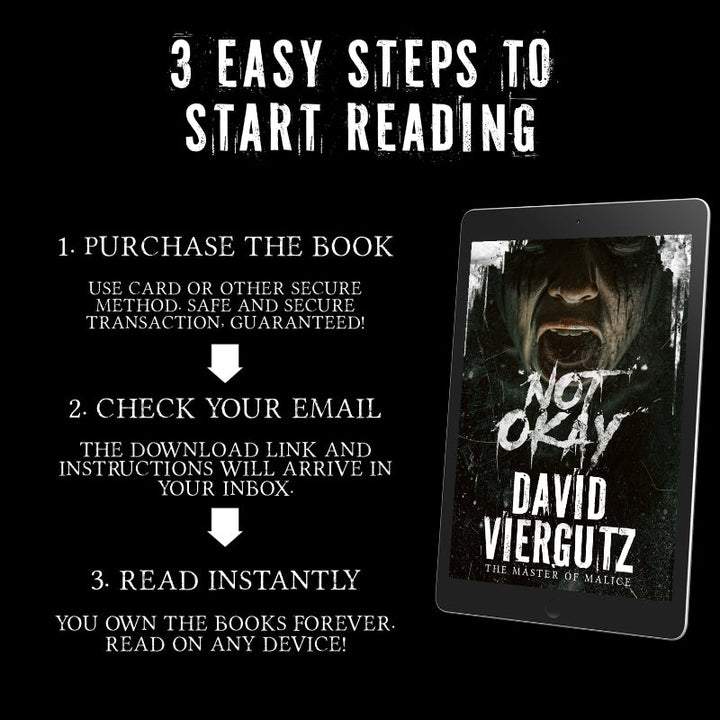Not Okay (EBOOK)
My name is Marvin May and I am okay.
I am not a thief or a pervert, and the crimes of my youth are behind me.
I go to church on Sundays when I remember and ask God for forgiveness when I don’t.
I’m okay.
I probably have an anger problem, but who doesn’t? I’ve never hit anyone, or anything.
I promise, I’m fine.
I live in a little house in a small town and keep to myself. I’m only one payment behind on my credit card, and the doctor says I could lose a few pounds. I’m just like everyone else.
But there is something I should mention.
I have this one little issue.
One tiny problem I can’t seem to fix.
One itch I can’t seem to scratch…
I want to kill my wife.
Hi, my name is Marvin May … and I am not okay.
Ebook, delivered by Bookfunnel, read on any device.
Print books shipped from my independent printer.
Ebooks and audiobooks are delivered by email through Bookfunnel. Check your email and then download or read listen on your favorite device.
You can read the ebooks on any ereader (Amazon, Kobo, Nook), your tablet, phone, computer, and/or in the free Bookfunnel app.
Chapter 1
I hunched over the granite countertop in the kitchen, poring over the morning paper. The story held my interest in its stupidity: a pet pageant was in a civil spat with a traveling circus over ground reservations for their event. Beyond that, there was terror in the Middle East, but since when was there not? God was once again trying to wipe Florida off the map during hurricane season, and BBQ and Smoker combos were on sale at my local hardware store.
This was about the most interesting thing I’d suffer through that day.
I sipped loudly as my wife, Emma, sauntered into the kitchen. She dragged her soft fingers just above my belt line.
“Coffee’s made,” I said, pretending to be engrossed in the pet pageant story. In truth, I was more interested in the ads about travel destinations. We hadn’t vacationed in a while and I was starting to feel the itch. It was weird, that itch; a sort of longing for something new, only to find you desire the familiarity of home immediately upon leaving. I turned back to the pet story and scoffed. It’s not that I don’t like animals; I just don’t like the responsibility of feeding, raising, and loving them. Call me evil or heartless, it doesn’t matter to me.
I flipped the page, knowing full well what the other side held: unrealistic travel expectations. Too risky; flights got canceled, and the all-inclusive packages at places like Sandals were often not inclusive. Eventually, they found something to charge you for. It almost seemed like vacations and a budget didn’t go together.
The woods, perhaps? Everyone was fine with a bit of camping, even a prim and proper woman like Emma Cross.
She poured herself a cup of coffee and leaned against the counter. Tapping the edge of the mug with her freshly manicured nails, I could tell she was formulating something clever to say. I eyed her up, from her open-toed heels to her sculpted calves. I consider myself to be a lucky man, and I’m sure others think the same. She held her chin high and her shoulders back—you know, showing her decorum. But I like to make her squeal. Where’s her composure then, when her legs are shaking?
Emma lifted the coffee to her lips, looking out over the brim. I caught her gaze and batted my eyes with extreme exaggeration. She did the same and, together, we shared a brief moment where our laughter was contained, only to break out into cramping belly laughs.
I embraced my wife, slipping my hands around her waist and playfully grazing my fingertips up and over her hips. She gave a little wiggle, then rested her head on my shoulder. Her loose dark brown curls hung in my face and I caught the fleeting smell of burnt curling iron, hairspray, and lavender. She pulled away and retrieved her coffee, then proceeded to putter around the kitchen, attending to last night’s dishes―an empty bottle of Chardonnay, two glasses, and plates bearing the remains of grilled chicken and homemade pasta. I might have worked at a gas station, but I still had some pride in my cooking.
“I can get that. I don’t have to be in until tonight,” I said, leaning up against the counter.
“I’ve got it,” she said, attending to a plate. “You should be in bed. You know I hate when you’re up at this time before a night shift.”
I shrugged. “I need to call around, you know that. The nights are … well, for the night,” I said, my voice dipping out of apprehension, or shame, even.
Hi, my name is Marvin. I’m fifty years old, and I work as a night shift clerk at a gas station. I’m an author who hasn’t sold a single book. My wife, on the other hand, is a contained Playboy bunny and tenured high school math teacher. She also has a very successful crochet business on the side. I live in a fantasy land where I am no longer screamed at by drunk co-eds at 3:00 A.M. or fighting off mosquitoes who find their way into my little gas station, buzzing around my head rather than the fifteen hi-viz lights that are available.
Call me pessimistic—I don’t care. I hate my job. I was frustrated and desperate for change. Like the father of rejection himself, Stephen King, I, too, mounted my rejection letters from publishers on the wall of my stuffy office. But while it makes a great story to laugh about to my endearing mother—who loved to ask if I’ve sold a book—the growing stack of papers felt more like the watchful eye of a Lovecraftian monster. Each letter represented an inch gained by an array of tentacles ready to strangle me from behind. Before, as a mason, I had steady work and could put my novel together late into the evenings. That felt rebellious in a way, like I was working myself out of work. I found it wholly motivational. Now, it seemed foolish, and it had become difficult not to be angry at the most mundane things.
I grunted and turned away. The paper lying open at the resort page offered no reprieve from my internalized assaults against my own self-worth. I knew in my heart of hearts that Emma meant well and wasn’t ready to judge an old man for getting laid off. As it turns out, a lot of bricklaying is done by machine.
Perhaps you’re seeking fulfillment. Perhaps you’re depressed. Perhaps you just need a vacation.
All potential causes for the sour taste in my mouth were wiped away in an instant when I saw Emma had switched from cleaning up to packing her lunch. Immediately, I shoved her out of the way with my hip and began packing the food I had prepared for her the night before. She smiled gently, her large brown eyes squinting behind sunbaked dimples. I was definitely out of my league.
“You don’t have to do that.”
“I do,” I said. “I have to do something.”
“You are. You’re chasing your dreams.”
“I work at a gas station. There’s no way in five fucking years we’ll be able to afford to move.” I could feel my temper flaring, the result of anger and frustration that had made each sent submission seem like an angry wasps’ nest building, one layer at a time. I wasn’t angry with Emma. I needed to change my tone.
I was instantly reminded of the consequences of losing my temper―it could kill her. Emma was diagnosed with early congenital heart failure. Bad genetics. If there’s such a thing as luck, that was terrible-fucking-ruin-your-life-luck. A simple spike in blood pressure could kill her.
When I’d asked once about rough sex, she’d said with a smile, “What better way to go?” Good thing I like to do the work, and it keeps the sex quick, passionate, and heart attack free.
“Sorry,” I said, somewhat nasally after shutting the refrigerator, hunting in the pantry for a bottle of water. It was smaller than I would have liked, only consisting of five shelves, each packed with canned fruits and vegetables I readily ignored on account of their three-year shelf life. I’d recently discovered the air fryer, designed by the cooking gods to turn any boring vegetable into a culinary masterpiece with just a pinch of garlic, salt, and pepper. Easy on the salt. Always easy salt.
I reached instinctively for the top shelf, then noticed the instant grits, a house staple, were missing from their usual spot to the far left of the oatmeal. I was always meticulous about the food, how it was cooked, and where it was placed.
Assuming the last of the grits must have been eaten that morning, I pulled my head out of the pantry and wrote grits on a magnetic list on the face of the refrigerator. On that same list was milk, honey, apples, and toilet paper. I’d make a grocery run after Emma left for work.
“Grits? You just bought some,” Emma said, leaning over my shoulder.
I turned back to the pantry. “I didn’t see any.”
“Look down,” she said dryly.
I looked down and saw the yellow and white cylindrical cardboard tube spilling out onto the floor. It looked like it had dropped from up high and crashed to the dark hardwood below, landing between a box used to store spare lightbulbs and a case of water.
“Huh?”
I peered closely and saw the grits—pale yellow minuscule kernels—outlining the shape of a foot. I stepped into the imprint and saw the outline of my house shoes fitted perfectly. I noticed a few kernels had made it onto my sweat pants, trace evidence left behind after the crime.
Ducking out of the pantry, I immediately went to the garage for a broom.
Had I really dropped the grits and not noticed? If so, when? Surely I would have heard the crash?
The container was nearly full. And if I had dropped them, why hadn’t Emma said anything when I didn’t start the cleanup?
When I returned, broom in hand, Emma was in the living room, gathering graded papers and her computer and stuffing them into her work bag. She didn’t say anything more about the grits. What was there to say? I must have simply dropped them in my preoccupation, wallowing in self-pity, and Emma, being who she was―reserved and collected―had continued about the morning’s pleasantries until 7:30 rolled around and she made for the door.
My cell phone vibrated in my pocket as her hand reached the door, a casual reminder of something pre-scheduled. I followed Emma out, carrying her purse, and handed it off before kissing her goodbye. While she was rearranging in the front seat of her car, I checked my notifications.
Sleep Doctor. 3:30 P.M.
“It’s a normal day for me, so I’ll be home around five thirty,” she said. “Maybe get some sleep? You need it.”
“In a bit. I’ve got to get groceries this morning, then I’ll be up a bit earlier than usual for a doctor’s appointment,” I replied, waving the phone around like it was a permission slip.
“Oh, good,” she said with heartfelt eyes. “I’m glad you finally got that scheduled.”
“I must have forgotten to tell you.” She suddenly looked sullen, her eyes taking on a flash of sorrow. To navigate her pity as well as my own, I said, “The bill will be astronomical.”
“But well worth it. I don’t think these problems you’re having are directly related to the night shifts. You were having nightmares even when you were amongst the living,” she said, a classic, heartfelt smile breaking across her face.
The humid morning air―usual for this part of Texas―sweet, with the scent of the rose bushes lining the patio, drifted into my nose. I briefly recalled that soon fall would come about, whisking away the scorching Texas summer in lieu of milder temperatures and breathtaking hues of brown and orange leaves. Our house backed onto a greenbelt and overlooked a highway intersection just beyond it. The intersection was ripe with the smell of baked concrete, burnt tires, and trash. Every few minutes, when the birds stopped singing, you could hear the rhythmic thump, thump as cars passed over a mismatched panel on the overpass.
“I’ll talk to the doctor about the fees. Maybe they have a payment plan,” I said, looking past Emma.
Emma started the car, and I caught the emotion she tried to mask with her silence. Disappointment.
Was she disappointed with me? Thinking back, I realized all that morning, she’d been trying to make small talk. She wanted to connect, to jabber on about nonsense, and instead I’d let my insecurities and anger consume me. Looking at me, it must have appeared like I was losing it, lost in my own thoughts and preoccupied with living in a future that didn’t exist yet. I felt terrible, plagued by a longing that usually came about whenever Emma went away for her annual teachers’ conferences in Madison. This felt like that—like her bags were packed and she was waiting in the car.
“I’m sorry,” I muttered. It was all I could manage. I had so much I wanted to say, to relay to my endearing wife, but it was all caught in my throat, becoming a painful lump that formed just beneath my Adam’s apple. I gritted my teeth and locked my jaw as she left.
I would make it up to her. When she got home, I’d have dinner ready, the house clean, and her favorite pajamas laid out. We’d sit and watch TV until we were both tired and she scooted off to bed. I’d rub her back with her favorite lotions from the set I bought her for last year’s anniversary (and promised to use but never did.) Then, I’d go to my dead-end job without a complaint and return the next morning, rejuvenated and readily missing her.
All these good intentions refused to manifest into the words I could feel Emma so desperately needed to hear. Instead, I came to the present as her little black SUV was backing out of the driveway, a smile on my face as I dreamt of how she’d feel when it was all said and done. She’d left without saying goodbye while I’d sat there and silently planned in my own head like an idiot.
The road to hell is paved with good intentions.
Well, consider yourself damned, buckaroo.
You screwed the pooch this time.
My own voice echoed idioms in my head until I shut the front door, sat back against it, and gave in to the growing weakness in my knees that threatened my balance. I laid my head against my knees like a scolded child and gave in to the lump in my throat, resulting in two forceful sets of tears. It felt odd to cry—more embarrassing than wrong. Sure, men cried. But for what―and for whom―was I crying? The tears left a salty trail on my cheeks, and I wiped them away with the back of my hand.
Sitting there, back against the front door, my body heat radiated upward from my chest to my nose, nearly igniting the hairs with the smell of sweat and sour milk.
Start with a shower. You’ll feel better with a shower. Then move on with your day.
But the shower didn’t help make me feel any better, and that, too, led to more frustration. Another brick paving the road to hell.







